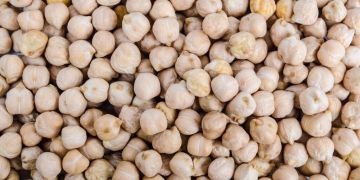The scientific name for this tiny pale legume is Cicer artetinum, a term that can be linked back to the Latin word Cicer. The Latin for chickpea then developed into the word chiche in French, which in the 1800's became the term that is widely used today; chickpea.
Chickpea plants, which are part of the Fabacea (pea) family, typically grow best in subtropical climates, which explains their popularity in Middle Eastern cuisine. The chickpea plant is a small shrub that grows to about 2 feet tall. It sprouts feathery leaves, and when blooming tiny red and white flowers appear. These flowers then become the pods that contain the chickpeas, and upon fruition of the development cycle they are ready to be harvested. If not consumed fresh, they can be dried for later use. While chickpeas cannot be taken in a capsule or powder form, most people simply incorporate them into their diet through food dishes or raw consumption.
Energy Production
One of the trace elements that is found in the chickpea is magnesium. When the body's level of magnesium is low, you can experience severe exhaustion and lethargy. In addition, according to the U.S. Department of Agriculture, in postmenopausal women a lack of magnesium may cause the muscles to contract, while also impairing cardiovascular function. Fortunately, chickpeas supply 84.5% of one's daily required value of magnesium. Therefore, adding chickpea supplements to your diet can dramatically increase energy while also addressing the detrimental effects of magnesium deficiencies for certain age groups.
Heart health
Chickpeas contain two significant components that are known to improve heart health and cholesterol. These components are folate and fiber. In studies conducted by medical researchers, it was found that individuals who consumed a high amount of fiber per day reduced their chances of coronary and cardiovascular heart disease. Additionally, the fact that chickpeas contain 70% folate also proves positive for those that are concerned about their heart health, as folate is also known to reduce the chance of heart disease and bad cholesterol.
Source of iron
Apart from magnesium, iron is also a significant mineral that affects energy levels and blood circulation. Without the proper levels of iron, the body cannot transport oxygen optimally through the body, thus hindering energy levels and blood circulation. Chickpea supplements are an excellent way to remedy this problem, as chickpeas contain high levels of iron. This holds true especially for women who are menstruating, pregnant, and growing children as they require more iron than the average person.
Weight loss
Chickpeas can be beneficial for weight loss and controlling blood sugar levels. Chickpeas have a low glycemic index, which helps to produce stable blood sugar levels. Foods with a low glycemic index break down gradually and slowly release glucose into the bloodstream. This provides the body with a steady supply of energy, leaving you satisfied for longer and therefore less likely to crave food.
Digestion
As stated earlier, chickpeas also contain a great amount of fiber. This fiber is insoluble, meaning that it is very healthy for your colon and digestive tract. As the fiber travels through the intestinal system, it produces short chain fatty acids that energize the cells of the intestinal wall, thus reducing the risk of colon issues, such as colon cancer.





